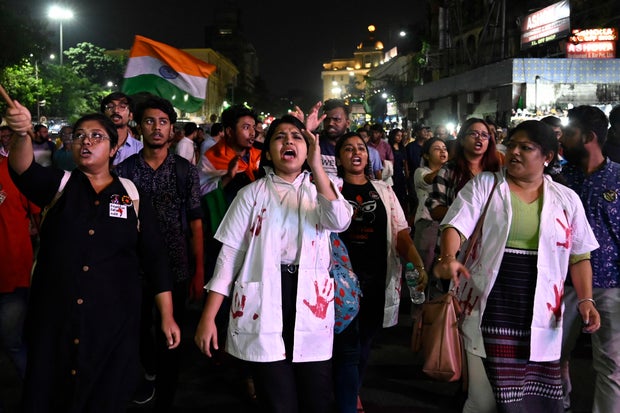New Delhi — More than three months after the rape and murder of a 31-year-old female doctor in India sparked wide-scale protests across the country, the trial of the only person accused of the brutal crime began Monday at a special court in the eastern state of West Bengal. The sole suspect in the case is Sanjoy Roy, a volunteer member of the Kolkata Police force who was formally charged with rape and murder last week.
If convicted, Roy could face life in prison, or the death penalty.
He’s claimed that he’s being framed, shouting from inside a police van while being taken from court to jail last week that he was completely innocent, according to Indian media reports.
“I have been silent so far. But I did not commit the rape and murder. I am being intimidated by the government and my own department. They have asked me not to say a word. But I am not guilty, I am being framed to shield the real culprits,” he reportedly said.
India was hit by widespread protests and mass doctors’ strikes in August, with medics walking off the job to demand justice for the young doctor who was found murdered in a lecture hall in Kolkata’s state-run R.G. Kar Medical College and Hospital on August 9.
Samir Jana/Hindustan Times/Getty
At the time, authorities said the woman had gone to the lecture hall to rest during a night shift when she was attacked. An autopsy confirmed that she was sexually assaulted before she was murdered. It also suggested she may have resisted her attacker and been tortured before being killed.
Medics across the country demanded safer workplaces, while citizens demanded safety for women in a nation where an average of 90 rapes were reported per day in 2022, according to the most recent government data.
About 128 witnesses are expected to take the stand during the trial, with hearings taking place on a daily basis as authorities aim to fast-track the high-profile case. The proceedings will not be open to the public.
India’s Central Bureau of Investigations (CBI) has also arrested a police officer and the superintendent of the hospital for alleged evidence tampering and financial irregularities.
The doctor’s killing brought back to the surface anger in the country over women’s safety that last boiled over in the wake of the 2012 gang-rape and murder of a young woman on a New Delhi bus as it was driven around the metropolis.
That brutal attack prompted India’s parliament to enact tougher laws on sexual violence, but it there’s been no evidence that the harsher laws have reduced the number of sexual assaults in the country.


